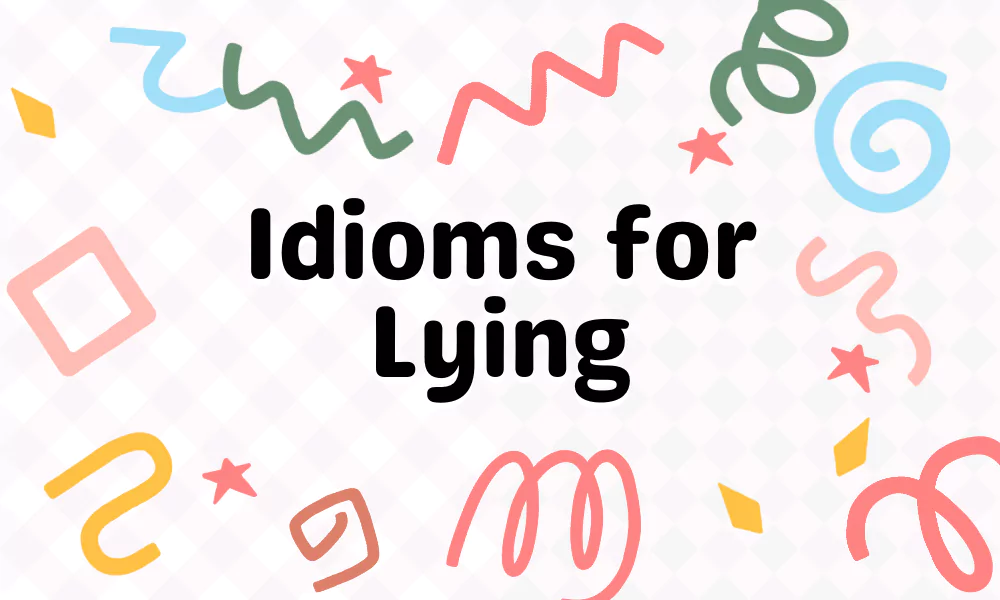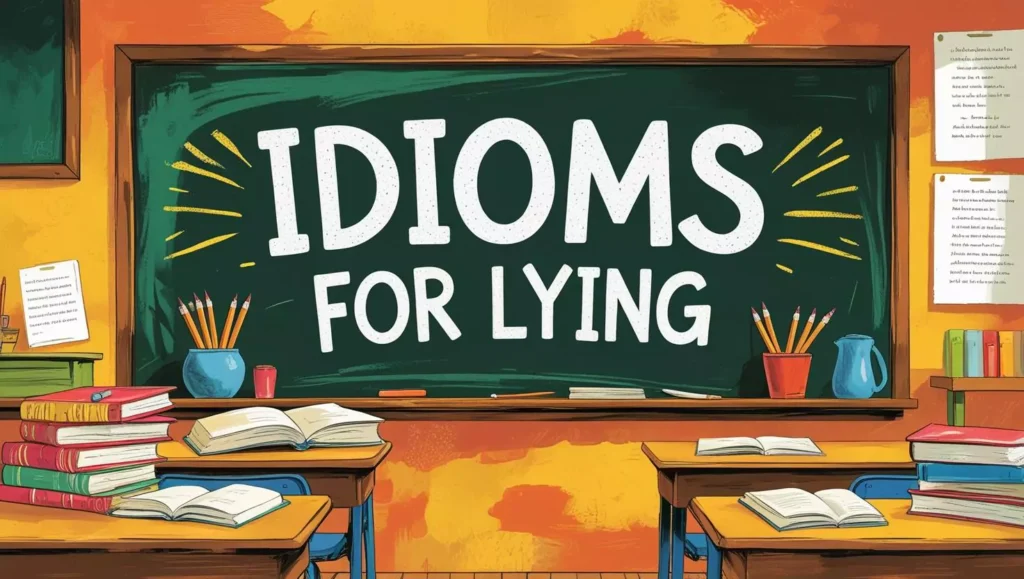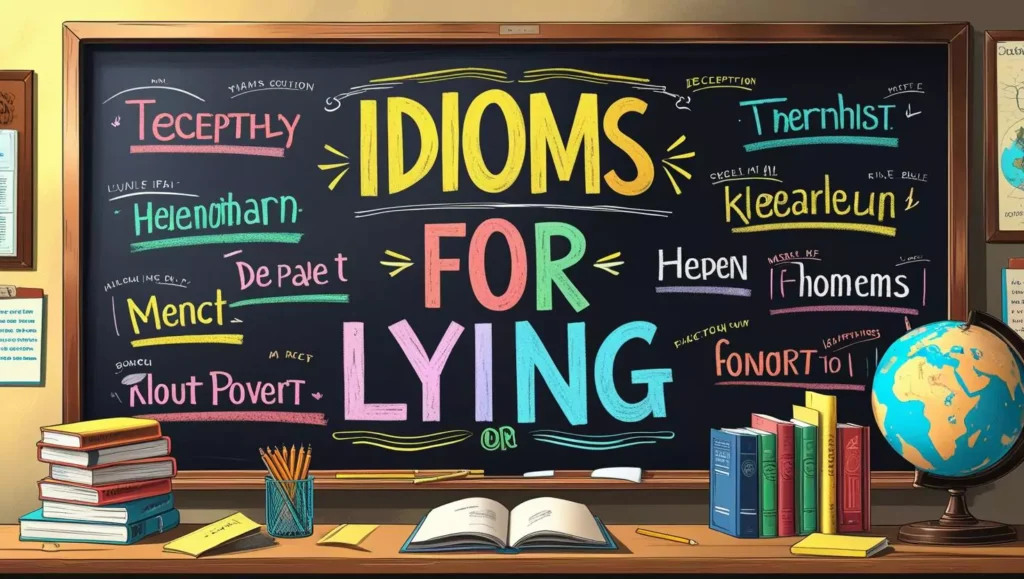Common Idioms For Lying – Definitions, Origins, and Real-Life Usage

Lies come in all shapes and sizes, from harmless little fibs to elaborate stories spun with careful intent. But instead of simply saying someone “lied,” English gives us a treasure trove of idioms that capture the art of deception with wit and color. These expressions go beyond plain words, painting vivid pictures of dishonesty, trickery, and half-truths. In this post, I’ll uncover some of the most powerful idioms for lying, explore what they really mean, and see how they bring everyday conversations and storytelling to life.
What Are Idioms for Lying?
Idioms for lying are expressions that describe dishonesty, deception, or stretching the truth in a figurative way rather than a literal one. Instead of directly saying someone “lied,” these idioms use imagery and metaphor to capture the act more vividly. They not only make language more colorful but also reflect how deeply lying and truth-telling are woven into human behavior and communication.

Commonly Used Idioms for Lying
- Bend the truth – To exaggerate or slightly change facts.
Example: She bent the truth about how much the dress cost. - White lie – A harmless or small lie told to avoid hurting someone.
Example: He told a white lie about liking the food. - Barefaced lie – A bold, obvious, and shameless lie.
Example: Claiming he never cheated was a barefaced lie. - Fib – A small or trivial lie.
Example: The child fibbed about finishing homework. - Pull the wool over someone’s eyes – To deceive someone.
Example: The scammer pulled the wool over their eyes. - Stretch the truth – To exaggerate beyond reality.
Example: She stretched the truth about her achievements. - Lie through one’s teeth – To lie blatantly and confidently.
Example: He lied through his teeth during the interview. - Cover up – To hide the truth or facts.
Example: They tried to cover up the accident. - Cook the books – To falsify financial records.
Example: The accountant cooked the books to hide losses. - Economical with the truth – Deliberately withholding key details.
Example: The politician was economical with the truth. - Tall tale – An exaggerated or unbelievable story.
Example: Grandpa told a tall tale about fighting a bear. - Make up a story – To invent a lie.
Example: He made up a story about being late. - Take liberties with the truth – To alter facts for convenience.
Example: The report took liberties with the truth. - Talk through one’s hat – To speak nonsense or dishonestly.
Example: He was talking through his hat about the project. - Con artist – Someone skilled in deception.
Example: The con artist fooled everyone with fake documents. - Fake it till you make it – Pretend to succeed until you actually do.
Example: He faked confidence until he made it. - Invent a lie – To fabricate something untrue.
Example: She invented a lie to avoid punishment. - Pull a fast one – To trick or deceive.
Example: He pulled a fast one on his boss to get time off. - Mask the truth – To hide reality.
Example: She masked the truth about her real feelings. - Half–truth – A statement that’s partly true but misleading.
Example: His excuse was a half-truth at best. - Live a lie – To pretend to be something you’re not.
Example: She lived a lie in her unhappy marriage. - Smoke and mirrors – Deceptive explanations that obscure reality.
Example: The deal was nothing but smoke and mirrors. - Two–faced – Someone who lies and acts differently with others.
Example: She was too two-faced to be trusted. - To hoodwink – To deceive or trick.
Example: He hoodwinked his friends into believing the prank. - Fabricate a story – To make up a false story.
Example: The witness fabricated a story about the night. - Pull someone’s leg – To tell a playful lie or joke.
Example: Relax, I’m just pulling your leg! - Double–dealing – Dishonesty or treachery.
Example: The businessman was known for double-dealing. - Face–saving lie – A lie to avoid embarrassment.
Example: He told a face-saving lie about why he was late. - Dish out lies – To spread false statements freely.
Example: The rumor mill kept dishing out lies. - Forked tongue – Speaking deceitfully.
Example: The leader spoke with a forked tongue. - String someone along – To deceive by giving false hope.
Example: She strung him along for months. - Put up a front – To pretend to be something you’re not.
Example: He put up a front of confidence. - Bluff – To mislead or deceive by pretense.
Example: He bluffed his way into the poker game. - Red herring – A distraction meant to mislead.
Example: The detective realized the clue was a red herring. - To spin a yarn – To tell a fanciful lie.
Example: He spun a yarn about being lost in the desert. - Deceive oneself – To believe one’s own lie.
Example: He deceived himself into thinking she cared. - Lie low – To hide to avoid detection (often after lying).
Example: He decided to lie low after the scandal. - False pretenses – Pretending for deceitful gain.
Example: He entered under false pretenses. - Lead someone up the garden path – To deceive or mislead.
Example: She led him up the garden path with fake promises. - Misrepresent the truth – To present dishonestly.
Example: He misrepresented the truth in his report. - Tell tales – To gossip or spread lies.
Example: The child told tales on her brother. - Cry wolf – To lie so often that you’re not believed when truthful.
Example: Nobody believed him because he always cried wolf. - Phony – Something or someone fake.
Example: The signature was phony. - On the sly – Doing something secretly.
Example: He lied about working late but was out on the sly. - Lie like a rug – To lie easily and naturally.
Example: He lies like a rug when in trouble. - Lead astray – To mislead someone into error.
Example: He led them astray with false directions. - Snow job – Deceptive talk meant to confuse.
Example: The salesman gave me a snow job. - Cover one’s tracks – To hide evidence of lying or wrongdoing.
Example: He covered his tracks after the fraud. - Play a double game – To act deceitfully on both sides.
Example: The spy played a double game. - False alarm – Something untrue that causes panic.
Example: It was just a false alarm about the fire.
Rare and Unique Idioms for Lying
- Juggle the facts – To manipulate the truth.
Example: He juggled the facts to make himself look good. - Twist someone’s words – To misrepresent what was said.
Example: She twisted his words to make him sound rude. - Shady dealings – Suspicious or dishonest behavior.
Example: The company was involved in shady dealings. - Truth on ice – Temporarily hiding the truth.
Example: He kept the truth on ice until it suited him. - Lip service – Saying something insincerely.
Example: He paid lip service to the plan but opposed it. - Build castles in the air – To invent unrealistic stories.
Example: He built castles in the air about his wealth. - Throw dust in someone’s eyes – To mislead or distract.
Example: The magician threw dust in their eyes with his words. - Make believe – Pretend something is real.
Example: As kids, we used to make believe we were spies. - Load the dice – To rig or cheat by deception.
Example: The game was loaded with dice against us. - Golden lie – A lie told with charm that seems believable.
Example: She got away with her golden lie. - Cloud the issue – To confuse by hiding truth.
Example: He clouded the issue with irrelevant facts. - Paint a false picture – To misrepresent reality.
Example: She painted a false picture of her life online. - Gild the lily – To exaggerate unnecessarily.
Example: He gilded the lily with stories of success. - Invent smoke – To create confusion with lies.
Example: The lawyer invented smoke to hide the truth. - Mirror trick – Clever deception or illusion.
Example: The ad campaign was a mirror trick. - Sugarcoat a lie – To make dishonesty sound pleasant.
Example: He sugarcoated the lie about the bad news. - Word jugglery – Using words to deceive.
Example: The politician’s word jugglery fooled the crowd. - Face of clay – False or weak foundation hidden under lies.
Example: The leader’s empire was built on a face of clay. - Borrowed truth – Twisting someone else’s story for deception.
Example: His speech was full of borrowed truth. - Golden mask – A shiny but false impression.
Example: Her charm was just a golden mask hiding lies.
Lying Idioms in Literature and Pop Culture
- What a tangled web we weave (Walter Scott) – Lies create complications.
Example: “Oh, what a tangled web we weave when first we practice to deceive.” - Big Brother is watching you (Orwell) – A deceptive authority.
Example: The regime lied under the guise of “Big Brother.” - The emperor’s new clothes (Hans Christian Andersen) – Believing in a lie out of fear.
Example: The officials pretended to see the emperor’s new clothes. - Down the rabbit hole (Lewis Carroll) – Entering a world of deception/confusion.
Example: She felt she’d gone down the rabbit hole of lies. - Smoke and mirrors (magicians/pop culture) – Illusion used to deceive.
Example: The movie industry is full of smoke and mirrors. - Catch-22 (Joseph Heller) – A paradox often rooted in dishonest logic.
Example: The contract was a real Catch-22 situation. - The boy who cried wolf (Aesop’s fable) – A liar loses credibility.
Example: He was ignored like the boy who cried wolf. - Potemkin village – A false show to hide the truth.
Example: The city was a Potemkin village of prosperity. - The green light (Gatsby) – False hope or illusion.
Example: Daisy’s love was Gatsby’s green light—an illusion. - All the world’s a stage (Shakespeare) – People hide behind roles.
Example: He lived by lies because “all the world’s a stage.” - The mask of Zorro – A persona hiding the truth.
Example: He wore success like the mask of Zorro. - Trojan horse – A hidden lie inside a gift.
Example: The proposal was a Trojan horse of deception. - Pied Piper – Someone deceiving and leading others astray.
Example: The scammer was a modern-day Pied Piper. - Glass slipper (Cinderella) – A deceptive fit or illusion of truth.
Example: The story was a glass slipper that didn’t fit. - The Scarlet Letter (Hawthorne) – Concealing sin under lies.
Example: She bore her secret like the Scarlet Letter. - Red pill / Blue pill (Matrix) – Choosing between truth and comforting lies.
Example: He preferred the blue pill of ignorance. - The man behind the curtain (Wizard of Oz) – Hidden deceiver.
Example: The leader was just the man behind the curtain. - Golden ticket (Willy Wonka) – False hope or illusion of luck.
Example: The scheme promised a golden ticket to success. - Wolf in sheep’s clothing (Bible) – Someone hiding evil with a false appearance.
Example: The fraudster was a wolf in sheep’s clothing. - Mirror, mirror (Snow White) – Deceptive reflection of truth.
Example: Her online profile was a “mirror, mirror” lie.

Synonyms and Alternatives for Lying
| Synonyms | Meanings |
|---|---|
| Dishonesty | General term for being untruthful or deceptive. |
| Deception | The act of deliberately misleading others. |
| Fabrication | A complete invention of something false. |
| Falsehood | A false statement; the opposite of truth. |
| Falsification | Deliberate alteration of facts or evidence. |
| Fraudulence | Deceit for personal or financial gain. |
| Mendacity | Formal word meaning habitual lying. |
| Pretense | An attempt to make something false appear true. |
| Duplicity | Double-dealing; being deceitful in words or actions. |
| Misrepresentation | Presenting something inaccurately or misleadingly. |
Tips for Using Lying Idioms in Writing and Speech
Using idioms about lying can make your communication sharper, more colorful, and more relatable. However, they work best when used thoughtfully. Here are some practical tips:
- Match the Idiom to the Context – Choose an idiom that fits the tone. For example, “white lie” works well in casual, lighthearted contexts, while “barefaced lie” suits serious accusations.
- Avoid Overuse – Too many idioms in one sentence or paragraph can confuse readers. Sprinkle them sparingly for impact.
- Know Your Audience – Some idioms (like “smoke and mirrors”) are widely understood, while others may puzzle non-native speakers. Pick idioms your audience will grasp easily.
- Use Idioms to Add Nuance – Idioms let you describe dishonesty with more precision. Saying “He stretched the truth” feels different from “He lied through his teeth.”
- Blend Idioms Naturally – Don’t force idioms into writing or speech. They should feel like a natural part of the sentence, not an awkward insertion.
- Experiment in Storytelling – When writing stories or speeches, idioms can bring characters and situations to life. A liar who always “cries wolf” or “spins a yarn” instantly feels more vivid.
- Practice with Substitution – Try replacing a plain word like “lie” with an idiom to see if it adds more depth or color to your sentence.
Read: Idioms for Confusion
FAQs
Conclusion
Lying is a universal behavior, and languages around the world have developed rich idiomatic expressions to describe it. From common phrases like “white lie” and “bend the truth” to more unique ones like “throw dust in someone’s eyes” or “wolf in sheep’s clothing,” idioms give us colorful, memorable ways to capture dishonesty in all its forms.
Whether you’re writing creatively, improving your English, or simply adding flair to everyday conversations, using idioms for lying can make your language more expressive and impactful. The key is to choose idioms that fit the situation, use them naturally, and understand their cultural context.
